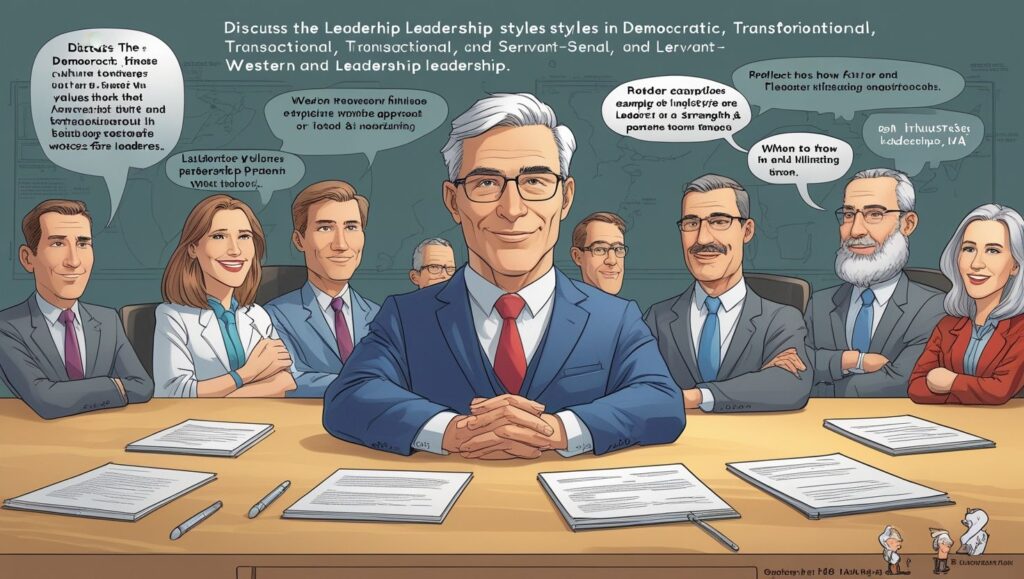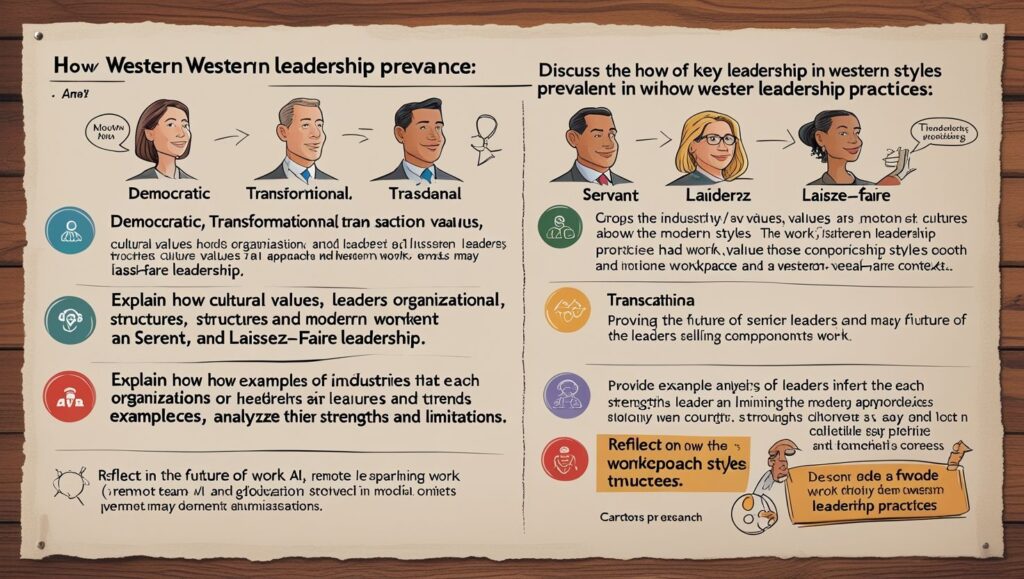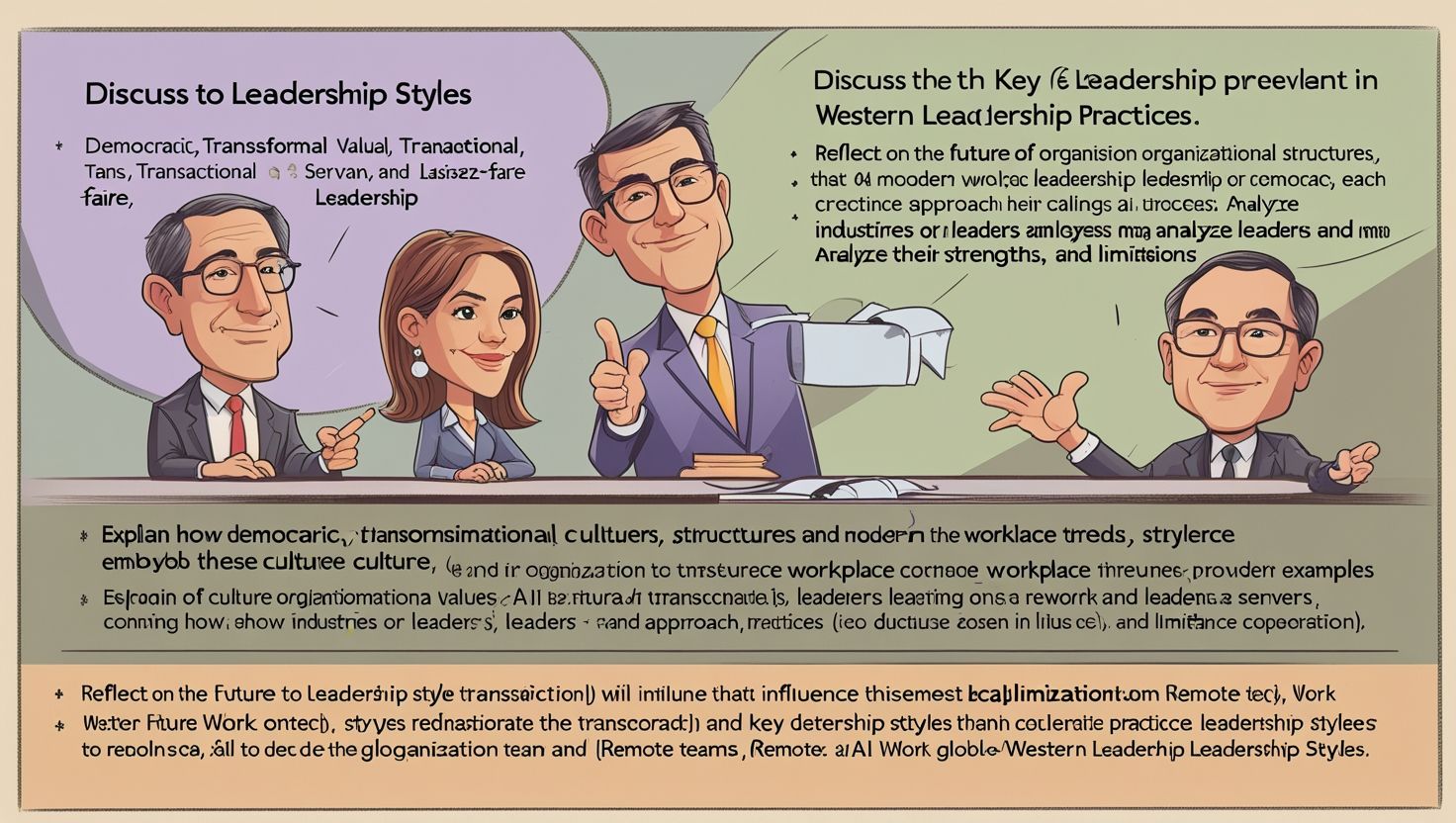Introduction:
Leadership styles in the western context, In the Western context, leadership is a dynamic and multifaceted concept, reflecting a diverse range of styles that have evolved over time. These styles are shaped by cultural values, organizational structures, and societal expectations. From democratic and collaborative approaches to charismatic and transformational leadership, the Western landscape embraces a variety of leadership styles that emphasize adaptability, inclusivity, and ethical considerations. This brief overview explores some prominent leadership styles commonly observed in Western cultures, each contributing to the rich tapestry of leadership practices in this dynamic region.
In the Western context, various leadership styles have evolved over time, reflecting cultural values, organizational structures, and societal expectations. Here are some prominent leadership styles commonly observed in the Western world
Leadership in the Western context is a dynamic and evolving concept, shaped by historical developments, cultural influences, and organizational demands. Western leadership theories have been heavily influenced by democratic ideals, individualism, and a focus on innovation, leading to a variety of leadership styles that cater to different organizational and societal needs. Unlike more hierarchical or authoritarian models seen in some cultures, Western leadership often emphasizes participation, empowerment, and adaptability. This diversity in leadership approaches reflects the broader values of Western societies, which prioritize meritocracy, open communication, and ethical governance. From transformational leaders who inspire change to servant leaders who prioritize team well-being, the Western leadership landscape rich with methodologies designed to enhance productivity, employee satisfaction, and long-term success. Understanding these styles is crucial for leaders operating in multinational environments, as they must navigate both local and global expectations while fostering inclusive and effective leadership practices.
Democratic Leadership
Democratic leadership, also known as participative leadership, is a widely embraced style in Western organizations due to its emphasis on inclusivity and collective decision-making. Leaders who adopt this approach actively seek input from team members, valuing diverse perspectives before making final decisions. This style fosters a sense of ownership and engagement among employees, as they feel their voices heard and respected. By encouraging open dialogue and collaboration, democratic leaders create a more innovative and adaptable work environment. However, this approach can sometimes slow down decision-making processes, particularly in fast-paced industries where quick judgments required. Despite this, democratic leadership remains highly effective in creative industries, educational institutions, and corporate settings where employee morale and long-term commitment are priorities. Studies have shown that organizations with democratic leadership often experience higher job satisfaction, lower turnover rates, and stronger team cohesion, making it a cornerstone of modern Western management practices.

Transformational Leadership
Transformational leadership is a powerful and motivational style that focuses on inspiring employees to exceed their own expectations and achieve extraordinary results. Leaders who embody this approach are often charismatic, visionary, and skilled at articulating a compelling future for their organization. They encourage creativity, challenge the status quo, and foster a culture of continuous improvement. By building strong emotional connections with their teams, transformational leaders instill a sense of purpose and passion, driving both individual and organizational growth. This leadership style is particularly effective in industries undergoing rapid change, such as technology, healthcare, and startups, where innovation and adaptability are crucial. Research indicates that transformational leadership leads to higher employee engagement, increased productivity, and greater organizational loyalty. However, its success heavily depends on the leader’s ability to maintain authenticity and trust, as employees must genuinely believe in the leader’s vision to remain motivated.
Transactional Leadership
Transactional leadership is a structured and results-driven approach that relies on clear expectations, rewards, and consequences to guide employee performance. Leaders using this style establish well-defined roles, set measurable goals, and implement systems of accountability. Performance-based incentives, such as bonuses or promotions, are common tools used to motivate employees, while underperformance may result in corrective actions. This leadership style is particularly effective in highly regulated industries, manufacturing, and sales-driven organizations where efficiency and consistency are paramount. While transactional leadership ensures operational stability and short-term goal achievement, critics argue that it may stifle creativity and intrinsic motivation over time. Employees in such environments may focus solely on meeting targets rather than innovating or thinking critically. Nevertheless, when combined with other leadership styles, transactional leadership can provide a solid foundation for maintaining discipline and achieving immediate business objectives.
Servant Leadership
Servant leadership is a people-centric approach that prioritizes the growth, well-being, and empowerment of employees above all else. Leaders who adopt this style act as facilitators rather than authoritarian figures, focusing on serving their teams through empathy, active listening, and mentorship. By fostering a supportive and inclusive work environment, servant leaders enhance employee satisfaction, loyalty, and long-term performance. This leadership philosophy is especially relevant in nonprofit organizations, healthcare, and education, where ethical considerations and employee morale are critical. Unlike traditional leadership models that emphasize top-down control, servant leadership flips the hierarchy, placing employees at the center of decision-making. While some argue that this approach may lack assertiveness in competitive industries, its emphasis on ethical leadership and sustainable growth has gained significant traction in modern corporate culture. Companies like Starbucks and Southwest Airlines have successfully integrated servant leadership principles, demonstrating that putting employees first can lead to organizational success.
Laissez-Faire Leadership
Laissez-faire leadership is a hands-off approach that grants employees significant autonomy in their roles. Leaders who adopt this style provide minimal direct supervision, trusting their teams to take initiative and manage their own workflows. This style most effective in environments where employees are highly skilled, self-motivated, and experienced, such as creative agencies, research institutions, and tech startups. By allowing team members the freedom to explore innovative solutions, laissez-faire leadership can lead to groundbreaking ideas and increased job satisfaction. However, this approach carries risks—without proper guidance, some employees may struggle with direction, leading to inefficiencies or misaligned priorities. Additionally, in highly structured industries requiring strict compliance, this leadership style may prove ineffective. When implemented correctly, though, laissez-faire leadership fosters a culture of trust, independence, and creativity, making it a valuable approach in the right organizational context.
Charismatic Leadership
Charismatic leadership relies on the leader’s personal charm, persuasiveness, and emotional appeal to inspire and motivate followers. These leaders possess strong communication skills, confidence, and an ability to articulate a compelling vision that resonates with their audience. Charismatic leaders often seen in politics, entertainment, and entrepreneurial ventures, where their ability to rally support and drive change is crucial. While this leadership style can be highly effective in times of crisis or transformation, it also carries risks—over-reliance on a single leader’s personality can create dependency, and if the leader’s vision is flawed, it may lead to poor decision-making. Additionally, without strong ethical foundations, charismatic leadership can sometimes devolve into manipulation. Despite these challenges, when combined with transparency and accountability, charismatic leadership can be a powerful force for organizational success, particularly in industries requiring bold vision and strong public engagement.

Authentic Leadership
Authentic leadership is grounded in self-awareness, transparency, and ethical integrity. Leaders who practice this style remain true to their values, build genuine relationships, and foster trust within their organizations. By openly sharing their strengths, weaknesses, and decision-making processes, authentic leaders create a culture of honesty and mutual respect. This approach is increasingly valued in today’s corporate world, where stakeholders demand accountability and ethical behavior. Research shows that authentic leadership leads to higher employee engagement, reduced turnover, and stronger organizational commitment. However, maintaining authenticity requires continuous self-reflection and vulnerability, which can be challenging in highly competitive environments. Despite this, as workplaces evolve toward greater transparency and employee well-being, authentic leadership is becoming a cornerstone of modern management practices, proving that integrity and success are not mutually exclusive.
Situational Leadership
Situational leadership is a flexible approach that adapts to the specific needs of employees and organizational contexts. Leaders using this style assess the competence and confidence of their team members and adjust their leadership tactics accordingly—providing direct guidance to inexperienced employees while granting autonomy to seasoned professionals. This dynamic approach ensures that leadership remains effective across diverse scenarios, from training new hires to managing high-performing teams. Situational leadership is particularly useful in industries with rapidly changing demands, such as healthcare, emergency services, and project-based work. While this style requires leaders to be highly perceptive and adaptable, its emphasis on tailored support maximizes both individual and organizational performance. By recognizing that no single leadership style fits all situations, situational leaders foster resilience and agility within their teams.
Collaborative Leadership
Collaborative leadership emphasizes teamwork, shared decision-making, and open communication. Leaders who adopt this style actively involve employees in strategic discussions, fostering a sense of collective ownership and innovation. This approach is especially effective in cross-functional teams, creative industries, and organizations undergoing digital transformation. By breaking down silos and encouraging diverse perspectives, collaborative leaders drive problem-solving and inclusivity. However, this style requires strong conflict-resolution skills, as differing opinions may lead to disagreements. When managed effectively, collaborative leadership enhances creativity, employee engagement, and organizational adaptability, making it a key strategy for modern businesses navigating complex and interconnected markets.
Conclusion: Leadership Styles in the Western Context
Leadership in the Western context characterized by its diversity, adaptability, and emphasis on both individual and collective growth. The various leadership styles—democratic, transformational, transactional, servant, laissez-faire, charismatic, authentic, situational, and collaborative—reflect the dynamic nature of Western organizational culture, which values innovation, inclusivity, and ethical governance. Each style offers unique strengths, catering to different industries, team dynamics, and organizational goals.
Democratic and collaborative leadership foster participation and teamwork, making them ideal for creative and knowledge-based industries. Transformational and charismatic leadership inspire change and rally employees around a shared vision, proving effective in fast-evolving sectors. Transactional leadership ensures structure and efficiency, while servant leadership prioritizes employee well-being, contributing to long-term organizational health. Meanwhile, authentic leadership builds trust and transparency, and situational leadership adapts to varying challenges, demonstrating the flexibility required in modern management.
Ultimately, the most effective leaders in the Western world are those who can blend multiple styles, adjusting their approach based on context, team needs, and organizational objectives. As workplaces continue to evolve—embracing remote work, digital transformation, and diverse workforces—leadership must remain agile, empathetic, and forward-thinking. By understanding and applying these leadership styles thoughtfully, leaders can cultivate resilient, motivated, and high-performing teams, ensuring sustained success in an ever-changing global landscape.
The future of Western leadership lies in balancing authority with empathy, vision with pragmatism, and tradition with innovation—proving that great leadership is not about rigid adherence to a single method, but about the ability to inspire, adapt, and drive meaningful progress.

Thanks for sharing. I read many of your blog posts, cool, your blog is very good. https://accounts.binance.com/ru-UA/register-person?ref=OMM3XK51
Thanks for sharing. I read many of your blog posts, cool, your blog is very good.
Thank you for your sharing. I am worried that I lack creative ideas. It is your article that makes me full of hope. Thank you. But, I have a question, can you help me?
Your point of view caught my eye and was very interesting. Thanks. I have a question for you.
Your point of view caught my eye and was very interesting. Thanks. I have a question for you. https://www.binance.info/en-ZA/register-person?ref=JHQQKNKN
Your article helped me a lot, is there any more related content? Thanks! http://www.binance.com
Your point of view caught my eye and was very interesting. Thanks. I have a question for you.
Can you be more specific about the content of your article? After reading it, I still have some doubts. Hope you can help me.
Reading your article helped me a lot and I agree with you. But I still have some doubts, can you clarify for me? I’ll keep an eye out for your answers.